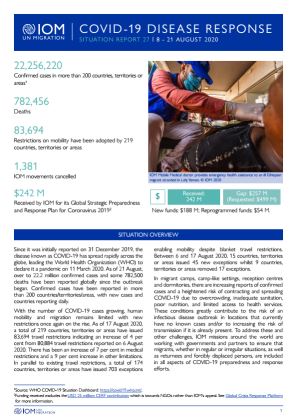-
Countries
-
Data and Analysis
-
Special Focus
-
Crisis Responses
Covid-19 Disease Response - Situation Report 27 (8 - 21 August 2020)

Contacto
COVID Response HQ covid19ops@iom.int
Idioma
English
Ubicación
Global
Fecha de instantánea
Aug 08 2020
Aug 21 2020
Actividad
- Other
Since it was initially reported on 31 December 2019, the disease known as COVID-19 has spread rapidly across the globe, leading the World Health Organization (WHO) to declare it a pandemic on 11 March 2020. As of 21 August, over to 22.2 million confirmed cases and some 782,500 deaths have been reported globally since the outbreak began. Confirmed cases have been reported in more than 200 countries/territories/areas, with new cases and countries reporting daily.
With the number of COVID-19 cases growing, human mobility and migration remains limited with new restrictions once again on the rise. As of 17 August 2020, a total of 219 countries, territories or areas have issued 83,694 travel restrictions indicating an increase of 4 per cent from 80,884 travel restrictions reported on 6 August 2020. There has been an increase of 7 per cent in medical restrictions and a 9 per cent increase in other limitations. In parallel to existing travel restrictions, a total of 174 countries, territories or areas have issued 703 exceptions enabling mobility despite blanket travel restrictions. Between 6 and 17 August 2020, 15 countries, territories or areas issued 45 new exceptions whilst 9 countries, territories or areas removed 17 exceptions.
In migrant camps, camp-like settings, reception centres and dormitories, there are increasing reports of confirmed cases and a heightened risk of contracting and spreading COVID-19 due to overcrowding, inadequate sanitation, poor nutrition, and limited access to health services. These conditions greatly contribute to the risk of an infectious disease outbreak in locations that currently have no known cases and/or to increasing the risk of transmission if it is already present. To address these and other challenges, IOM missions around the world are working with governments and partners to ensure that migrants, whether in regular or irregular situations, as well as returnees and forcibly displaced persons, are included in all aspects of COVID-19 preparedness and response efforts.
